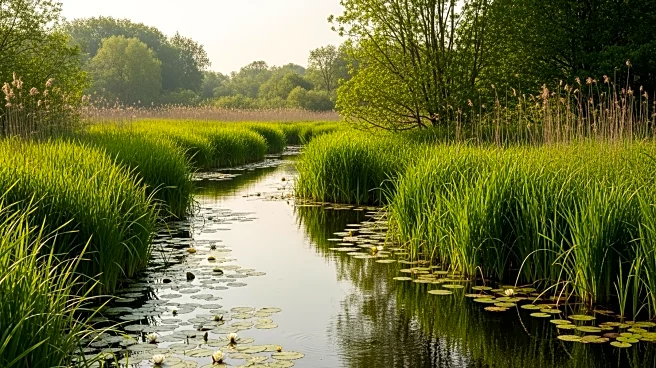What's Happening?
John Packham, the outgoing chief executive of the Broads Authority, has highlighted the severe impact of climate change on the Norfolk and Suffolk Broads. He warns that rising sea levels and increased flooding could transform the landscape back to its
Roman-era estuary state. The Broads, a network of rivers and lakes, are facing challenges from encroaching North Sea waters and riverbank breaches. Packham suggests that land must be surrendered to create floodplains to protect homes and communities from flooding. The Broads Authority is considering strategies similar to those used in the Netherlands, where wetlands and floodplains are expanded to manage water levels. The situation is exacerbated by saline water intrusion, which has killed thousands of fish over the years.
Why It's Important?
The potential transformation of the Norfolk and Suffolk Broads due to climate change has significant implications for local communities, ecosystems, and the economy. Rising sea levels threaten to submerge low-lying areas, impacting residential properties and local businesses. The ecological balance of the Broads is at risk, with saline water intrusion affecting aquatic life. The Broads Authority faces financial challenges as declining boating activity reduces toll fee income, which is crucial for maintaining the waterways. This situation underscores the urgent need for adaptive strategies to mitigate climate change impacts and protect the region's natural and economic resources.
What's Next?
The Broads Authority is expected to continue exploring adaptive measures to manage the effects of climate change. This includes potentially reclaiming areas like the Lower Bure to absorb rising water levels. The authority may seek increased government funding to support these initiatives, given the decline in toll fee income. Local communities and stakeholders will likely be involved in discussions on how best to implement floodplain strategies. The situation calls for collaboration with international experts, particularly from regions like the Netherlands, to learn from their successful water management practices.
Beyond the Headlines
The transformation of the Broads could have long-term cultural and historical implications, as the landscape may revert to its ancient estuary form. This raises questions about preserving the historical identity of the region while adapting to environmental changes. Ethical considerations also arise regarding the displacement of communities and the loss of traditional livelihoods. The situation highlights the broader challenge of balancing environmental adaptation with cultural preservation in the face of climate change.















